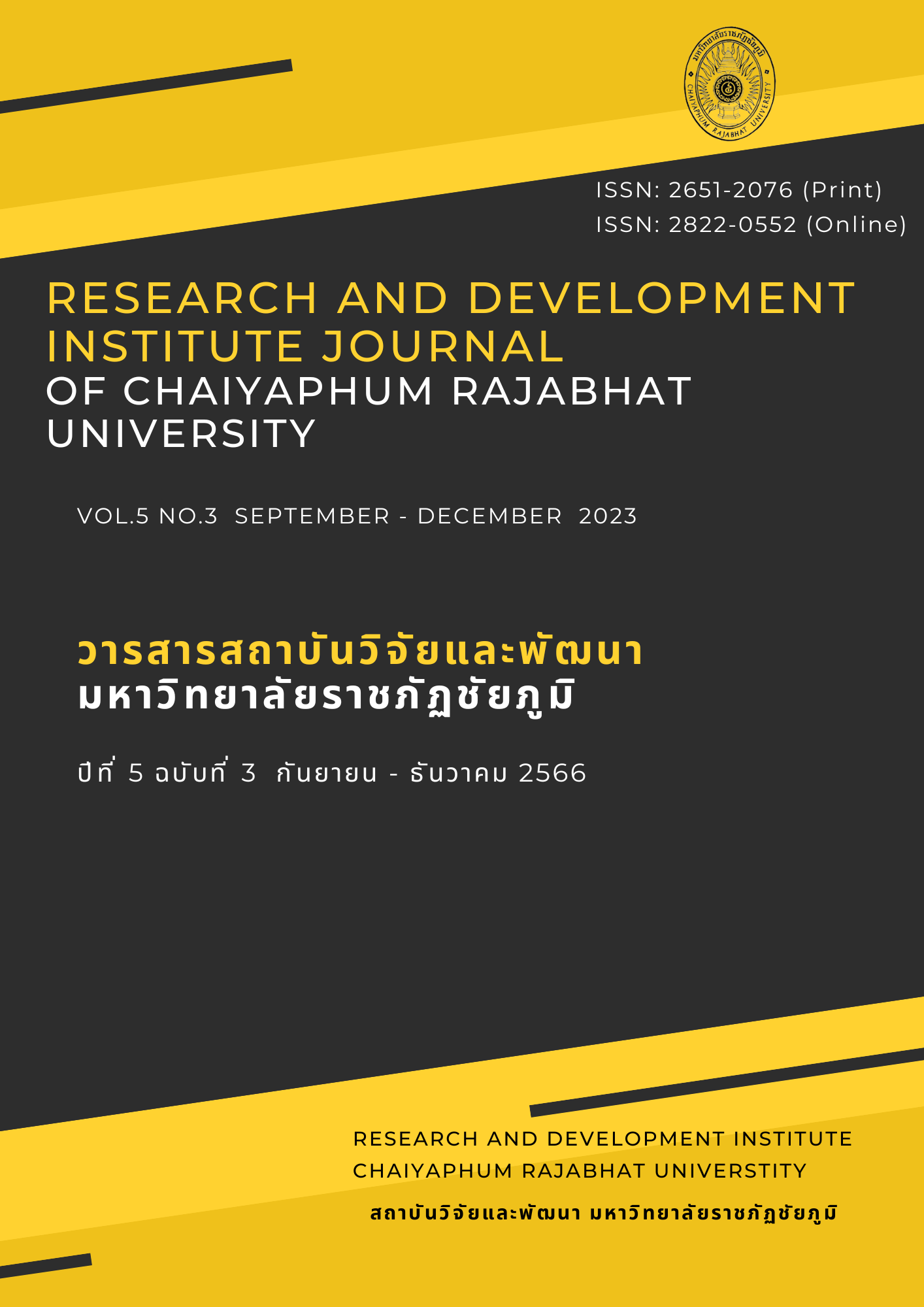แบบทดสอบวินิจฉัยมโนทัศน์ทางเลือกแบบห้าระดับสำหรับการระบุมโนทัศน์ทางเลือก ทางวิทยาศาสตร์ของนักเรียน
Main Article Content
บทคัดย่อ
แบบทดสอบวินิจฉัยมโนทัศน์ทางเลือกแบบห้าระดับ มีลักษณะเป็นแบบเลือกตอบหลายตัวเลือก (multiple-choice) ในระดับการตอบที่ 1 และระดับที่ 3 ส่วนระดับที่ 2 และระดับที่ 4 เป็นระดับความมั่นใจในการเลือกตอบในระดับที่ 1 และ 3 ตามลำดับ และระดับที่ 5 จะมีลักษณะเป็นการวาดภาพหรือการสรุป (Drawing/Conclusion) โดยเพิ่มระดับของข้อสอบในการตอบระดับที่ 5 ทำให้ได้ข้อมูลเชิงวินิจฉัยมโนทัศน์ในระดับลึกของผู้เรียนได้ ช่วยลดโอกาสการเดาข้อสอบได้ การตรวจให้คะแนนสำหรับข้อสอบระดับที่ 1 และระดับที่ 3 ทำได้ง่าย และช่วยให้ครูผู้สอนสามารถจำแนกได้ว่าการที่ผู้ตอบตอบผิดนั้นเป็นเพราะมีมโนทัศน์ทางเลือกหรือตอบผิดเพราะไม่มีความรู้ในเรื่องนั้น ๆ และมีสาเหตุของมโนทัศน์หรือขาดความรู้ในเรื่องใดบ้าง และการพัฒนาแบบทดสอบวินิจฉัยให้มีคุณภาพ ประกอบด้วย 3 ระยะ ได้แก่ ระยะที่ 1 การนิยาม (Define Stage) ระยะที่ 2 การออกแบบเครื่องมือ (Design Stage) และระยะที่ 3 การพัฒนาเครื่องมือ (Develop Stage)
Article Details

อนุญาตภายใต้เงื่อนไข Creative Commons Attribution-NonCommercial-NoDerivatives 4.0 International License.
การอนุญาตให้ใช้ข้อความ เนื้อหา รูปภาพ ฯลฯ ของสิ่งพิมพ์ ผู้ใช้รายใดก็ตามที่จะอ่าน ดาวน์โหลด คัดลอก แจกจ่าย พิมพ์ ค้นหา หรือเชื่อมโยงไปยังข้อความทั้งหมดของบทความ รวบรวมข้อมูลสำหรับการจัดทำดัชนี ส่งต่อเป็นข้อมูลไปยังซอฟต์แวร์ หรือใช้เพื่อวัตถุประสงค์ทางกฎหมายอื่นใด แต่ห้ามนำไปใช้ในเชิงพาณิชย์หรือมีเจตนาเอื้อประโยชน์ทางธุรกิจใดๆ เผยแพร่ภายใต้สัญญาอนุญาตครีเอทีฟคอมมอนส์แบบแสดงที่มา-ไม่ใช้เพื่อการค้า (Creative Commons Attribution-NonCommercial-NoDerivatives 4.0 International License)

This work is licensed under a Creative Commons Attribution-NonCommercial-NoDerivatives 4.0 International License
เอกสารอ้างอิง
ชาตรี ฝ่ายคำตา. (2551). แนวคิดทางเลือกของนักเรียนในวิชาเคมี. วารสารศึกษาศาสตร์มหาวิทยาลัยสงขลานครินทร์ วิทยาเขตปัตตานี, 19(2),10-28.
Banawi, A., Sulaeman, S., Sopandi, W., Kadarohman, A., Solehuddin, M., & Ridwan, M. (2021). The effects of using predict-observe-explain strategy assisted by conceptual change text towards the conceptual mastery of prospective primary school teachers on the matter and its changes. Technium Soc. Sci. J., 23, 226-241. https://doi.org/10.47577/tssj.v23i1.4518
Bayuni, T. C., Sopandi, W., & Sujana, A. (2018). Identification misconception of primary school teacher education students in changes of matters using a five-tier diagnostic test. Journal of Physics: conference series, 1013(1), 012086. https://doi.org/10.1088/1742-6596/1013/1/012086
Dirman, H. M., Mufit, F., & Festiyed, F. (2022). Review and comparison of four-tier multiple choice and five-tier multiple choice diagnostic tests to identify mastery of physics concepts. Jurnal Penelitian Pendidikan IPA, 8(1), 1-12.
Fajriyyah, N. S., & Ermawati, F. U. (2020). The validity and reliability of five-tier conception diagnostic test for kinetic theory of gases. Inovasi Pendidikan Fisika, 9(2), 126-132.
Fatonah, U., Maison, M., & Hidayat, M. (2022). Development of Five-Tier Diagnostic Test to Identify Misconception in Rigid Body Equilibrium. Berkala Ilmiah Pendidikan Fisika, 10(2), 199-206.
Gurel, D. E. R. Y. A., Eryilmaz, A., and McDermott, L. (2015). A review and comparison of diagnostic instruments to identify students' misconceptions in science. Eurasia Journal of Mathematics Science and Technology Education, 11(5), 989–1008.
Karslı, F., and Ayas, A. (2013). Prospective science teachers’ alternative conceptions about the chemistry issues. Necatibey Faculty of Education Electronic Journal of Science and Mathematics Education, 7(2), 284-313.
Koc, I., and Yager, R. E. (2016). Preservice Teachers' Alternative Conceptions in Elementary Science Concepts. Cypriot Journal of Educational Sciences, 11(3), 144-159.
Lailiyah, S., & Ermawati, F. U. (2020). Materi gelombang bunyi: pengembangan tes diagnostic konsepsi berformat five-tier, uji validitas dan reliabilitas serta uji terbatas. JPFT (Jurnal Pendidikan Fisika Tadulako Online), 8(3).
Putra, A. S. U., & Hamidah, I. (2020). The development of five-tier diagnostic test to identify misconceptions and causes of students’ misconceptions in waves and optics materials. Journal of Physics: Conference Series, 1521(2), (022020). http://doi.org/10.1088/1742-6596/1521/2/022020
Qonita, M., & Ermawati, F. U. (2020). The validity and reliability of five-tier conception diagnostic test for vector concepts. Inovasi Pendidikan Fisika, 9(03), 459-465.
Quillin, K., & Thomas, S. (2015). Drawing-to-learn: a framework for using drawings to promote model-based reasoning in biology. CBE—Life Sciences Education, 14(1), es2.
Ramadhani, N. N., & Ermawati, F. U. (2021). Five-tier diagnostic test instrument for uniform circular motion concepts: Development, validity, reliability and limited trials. Jurnal Pendidikan Fisika, 9(1), 73-90.
Rif’at Shafwatul, A. N. A. M., Widodo, A., Sopandi, W., and Wu, H. K. (2019). Developing a five-tier diagnostic test to identify students’ misconceptions in science: an example of the heat transfer concepts. Elementary Education Online, 18(3), 1014-1029.
Rokhim, D. A., Widarti, H. R., & Sutrisno, S. (2023). Five-Tier Diagnostic Test Instrument Validation on Reaction Rate Materials: To Identify the Causes of Misconception and Student Representation. Jurnal Penelitian Pendidikan IPA, 9(3), 1380-1385.
Rosita, I., Liliawati, W., & Samsudin, A. (2020). Pengembangan Instrumen Five-Tier Newton’s Laws Test (5TNLT) Untuk Mengidentifikasi Miskonsepsi dan Penyebab Miskonsepsi Siswa. Jurnal Pendidikan Fisika Dan Teknologi, 6(2), 297-306.
Royani, A., & Setyarsih, W. (2022). Development of Google Form-Based Five-Tier E-Diagnostic Test to Identify Conception Levels and Track Students' Misconceptions on Thermodynamics Materials. Prisma Sains: Jurnal Pengkajian Ilmu dan Pembelajaran Matematika dan IPA IKIP Mataram, 10(3), 450-465.
Salmadhia, F., Rusnayati, H., & Liliawati, W. (2021). Five-Tier Geometrical Optics Test Feasibility to Identify Misconception and the Causes in High School Students. Berkala Ilmiah Pendidikan Fisika, 9(2), 141-154.
Salsabila, F. N., and Ermawati, F. U. (2020). Validity and reliability of conception diagnostic test using five tier format for elasticity concepts. Inovasi Pendidikan Fisika, 9(03), 439-446.
Samborey, S., and Shimizu, K. (2019). Preliminary Finding on Teacher Trainees' Misconceptions in Atom and Molecule, Proceedings of the Annual Meeting of Japan Society for Science Education, 43, [volume title in Japanese], 590-593. https://doi.org/10.14935/jssep.43.0_590
Setiawan, D., & Jaelani, J. (2021). Five-Tier Diagnostic Test to Reveal Conceptual Understanding of Electrical Engineering Students. Berkala Ilmiah Pendidikan Fisika, 9(3), 326-334.
Soeharto, S., Csapó, B., Sarimanah, E., Dewi, F. I., and Sabri, T. (2019). A review of students’ common misconceptions in science and their diagnostic assessment tools. Jurnal Pendidikan IPA Indonesia, 8(2), 247-266.


